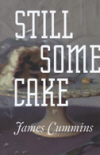Still Some Cake
James Cummins’s volume Still Some Cake tells a story whose meaning unfolds gradually, like in a puzzle, as one pieces together phrases, motifs, insights, scenes, catchwords, central figures, and word or theme repetitions. Because it is a story, it seems advisable to read the collection as a whole, from the first to the last page.
James Cummins’s volume Still Some Cake tells a story whose meaning unfolds gradually, like in a puzzle, as one pieces together phrases, motifs, insights, scenes, catchwords, central figures, and word or theme repetitions. Because it is a story, it seems advisable to read the collection as a whole, from the first to the last page.
Among the distinct themes that reverberate throughout the volume is that of partial knowing. It denotes the philosophical-existential state of incompleteness, as in “This Night of All Nights”: “Who can say / . . . why we are vulnerable / to dreams, and almost know.” The theme of “almost knowing” returns in the poem “The War of All Against All”:
It’s someone else’s dream, that we can know
each other. But nearly knowing the base
we build a life on, build a world.
In “Moses,” the fire (God) speaks to the poem’s title figure: “you know too much and too little, / to enter the land I promised you.”
It seems helpful to have identified this one among the volume’s several recurring motifs, because Cummins leads his readers throughout a thicket of themes, vistas, and modes. Sometimes we are invited to experience, together with the poet, things deeply personal: a father’s love for his daughter—a
sweet
serious first-born whose
carefree attitude hides
death-loyalty to her friends
or the difficulties of a marriage with a psychologically wounded person. Other times we are awed by the poet’s ability to grasp larger issues through his characters’ personal experiences, as in the poem “The Snipers,” which relates a conversation between two war-participants, a father who fought in Normandy and his son who fought in Vietnam. This poem captures the paradoxes of the “history of violence”—another frequent theme in Cummins’s volume. As each speaker depicts his experiences, the reader becomes increasingly aware of the horror underlying their exchange: “you would say it was a good job / to watch the melon of a man’s head / fly apart.” The poem captures the speakers’ entanglement in history and its legacy of aggression, of which they are both victims and executors. The son addresses the father: “I feel it was your sight along the barrel, / your heart I had to stop before I fired.”
American topography, history, and culture reverberate throughout the volume. For instance, the poem “November 22, 1963” depicts the time of the assassination of JFK. While sharing the general shock (“We’ll never get past this”), the lyrical subject asserts life: “I was fifteen: desire needed no abyss / . . . even hoary old Mrs. B—would writhe beneath me.” Written emphatically in the first person (from the boxer’s perspective), the exquisite poem “Brunch with Sonny Liston” tackles some of its title-hero’s biography, while echoing racism: “My own fork’s not good enough, right? Maybe some / black man’s saliva gets on a white guy’s salmon? / He’d die, right?”
The poem “Old Story” brings out another recurring motif, that of God. In his depictions of Abraham, his son Isaac, and Isaac’s wife Rebekah, Cummins poetically reinterprets the Bible’s “great narratives.” Abraham entertains his divine visitors, who have brought him the news of Sarah’s late pregnancy. Astonished, he notices that they resemble “a locust . . . / its wings dark in the sun.” Later in the poem, Rebekah discerns the locust in Abraham: “I swear the old man looked / like a locust himself—glittering, green, / black with rhapsody and rage.”
Eventually, God himself becomes locust; which echoes not only the Old Testament (or one of its “plagues”) but also bug-like aliens from modern sci-fi films; or even theories of the “alien insemination” of the human race. Befittingly, the part titled “Rebekah” begins with the invocation: “The locust is the Lord / The locust is the scourging Face. / The locust is the scourge of Elohim.”
“Old Story” tackles another recurring theme, that of the father. Because of his readiness to kill his son on God’s command, Abraham the father is in fact an anti-hero. Later in the volume, in the poem “Moses,” his act is identified as betrayal: “how does a son sit at a table, share / a meal with such a father, ever after?” This excerpt alludes not only to Isaac’s experience but echoes many other poems in the volume, with their recurring theme of a painful relationship with a father—the lyrical subject’s, his wife’s, Isaac’s with Abraham and God.
More themes can be discerned in Cummins’s complex, disquieting, occasionally accusatory, in many ways magical story. We could talk about time—where the past intertwines with the present, so that both lose their distinctiveness—or about place—where the sense of a locale becomes evoked through a detail (for instance a “country-fried chicken and mashed potatoes” as markers of a “small city in the Midwest”)—or about the ever-tentative border between self and another, as in the fascinating poem “War of All Against All.” All these and other motifs make Still Some Cake a rich and fascinating read.





